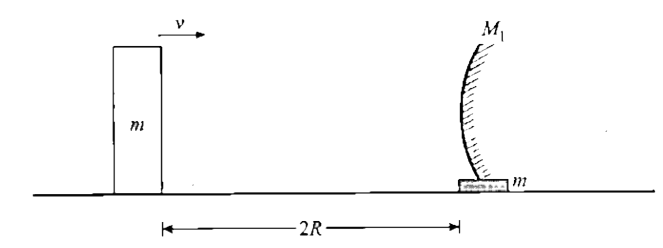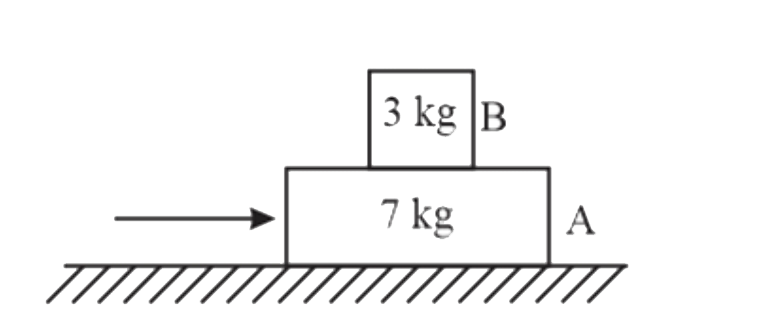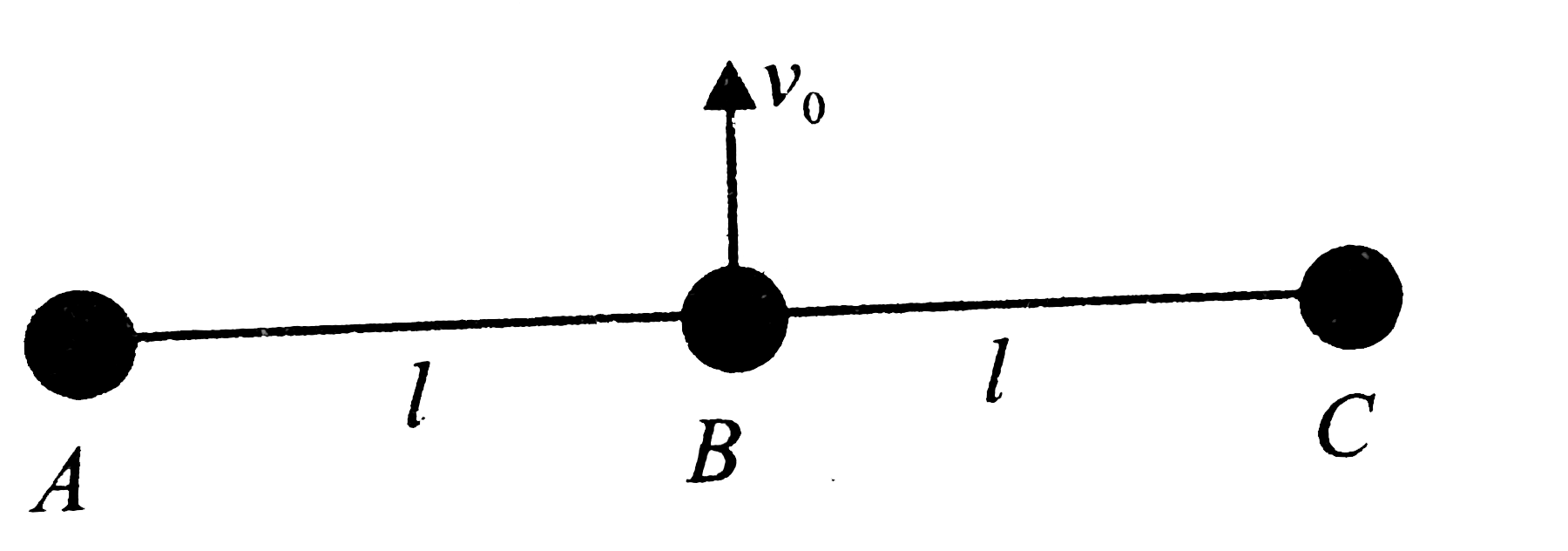A set of n identical cubical blocks lies at rest parallel to each other along a line on a smooth horizontal surface. The separation between the near surfaces of any two adjacent blocks is L . The block at one end is given a speed v towards the next one at time 0 t . All collisions are completely inelastic, then
The last block starts moving at
The last block starts moving at
The centre of mass of the system will have a final speed v
The centre of mass of the system will have a final speed
The correct Answer is:B, D

Since collision is perfectly inelastic so all the blocks will stick together one by one and move in a form of combined mass.
Time required to cover a distance ‘L’ by first block
Now first and second block will stick together and move with v/2 velocity (by applying conservation of momentum) and combined system will take time to reach up to block third.
Now these three blocks will move with velocity v/3 and combined system will take time to reach upto the block fourth.
So, total time
and and velocity of combined system having n blocks as .
Topper's Solved these Questions
- WORK , ENERGY , POWER AND COLLISIONBook:ERRORLESS Chapter:WORK , ENERGY , POWER AND COLLISIONExercise:Graphical Questions
Explore 28 Videos
- WORK , ENERGY , POWER AND COLLISIONBook:ERRORLESS Chapter:WORK , ENERGY , POWER AND COLLISIONExercise:Assertion & Reason For AIIMS Aspirants
Explore 30 Videos
- WORK , ENERGY , POWER AND COLLISIONBook:ERRORLESS Chapter:WORK , ENERGY , POWER AND COLLISIONExercise:Ordinary Thinking (Objective Questions) (Perfectly Inelastic Collision)
Explore 30 Videos
- WAVES AND SOUNDBook:ERRORLESS Chapter:WAVES AND SOUNDExercise:SET
Explore 25 Videos
- WORK, ENERGY, POWER & COLLISIONBook:ERRORLESS Chapter:WORK, ENERGY, POWER & COLLISIONExercise:Assertion
Explore 30 Videos
Similar Questions
2n identical cubical blocks are kept in a straight line on a horizontal smooth surface. The separation between any two consecutive blocks is same. The odd numbered blocks 1,3,5,.....(2n–1) are given velocity v to the right whereas blocks 2,4,6,......2n are given velocity v to the left. All collisions between blocks are perfectly elastic. Calculate the total number of collisions that will take place.

View SolutionA Convex mirror of radius of curvature R is fixed on a standat rest with total mass m which is facing a block of equal mass m as shown in figure and is kept on a frictionless horizontal surfece. The separation between the block and mirror is 2R and block is moving at a speed v toward the mirror. Consider elastic collision between block and stand, find the speed of image after time 3R/v.

View Solution
Knowledge Check
A set of a identical cubical blocks lies at rest parallel to each other along a line on a smooth horizontal surface. The separation between the near surface of any two adjacent blocks is L. The block at one and is given a speed v towards the next one at time t=0. All collisiona are completely inelastic , then the last block starts moving at
A(n−1)LvBn(n−1)L2vC(n+1)LvDn(n+1)L2vTwo identical 5kg blocks are moving with same speed of 2m/s towards each other along a frictionless horizontal surface . The two blocks collide , stick together and come to rest. Consider the two blocks as a system . The work done by the external and ijnternal force are respectively:
A0,0B0,20JC0,−20JD21J,−20JTwo blocks A and B are placed one over the other on a smooth horizontal surface. The maximum horizontal force that can be applied on the lower block A, so that A and B move without separation is 49N. The coefficient of friction between A and B is (take g = 9.8ms−2 )
 A0.2B0.3C0.5D0.8
A0.2B0.3C0.5D0.8
A large number of small identical blocks, each of mass m, are placed on a smooth horizontal surface with distance between two successive blocks being d. A constant force F is applied on the first block as shown in the figure

(a) If the collisions are elastic, plot the variation of speed of block 1 with time.
(b) Assuming the collisions to be perfectly inelastic, find the speed of the moving blocks after n collisions. To what value does this speed tend to if n is very large.
View SolutionThree blocks of identical masses are placed on a frictionless table as shown . The centre block is at rest , whereas the other two blocks are moving directly towards the stationary block with identical speed v . The centre block is initially closer to the left block than the right one . All collisions are elastic . After long time , which of the following is true .

View SolutionA small block of mass m and a concave mirror of radius R fitted with a stand lie on a smooth horizontal table with a separation d between them. The mirror together with its stand has a mass m. The block is pushed at t = 0 towards the mirror so that it starts moving towards the mirror at a constant speed V and collides with it. The collision is perfectly elastic. Find the velocity of the image (a) at a time t<dV, (b) at a time t>dV.
View SolutionA strip of wood mass M and length l is placed on a smooth horizontal surface. An insect of mass m starts from rest at one end of the strip and walks to the other end in time t, moving with a constant speed.
View SolutionThree identical balls are connected by light inextensible strings with each other as shown and rest over a smooth horizontal table. Length of each string is l.
At moment t=0, ball B is imparted a velocity v0 perpendicular to the strings and then the system is left on its own.

If collision between the balls is completely inelastic, then
View Solution

